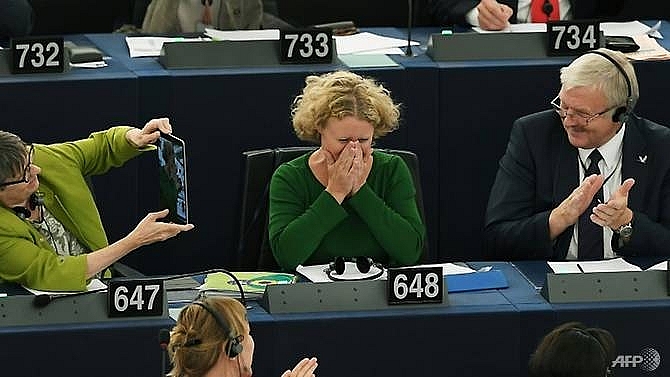Hungary to mount legal challenge to 'invalid' EU vote
 |
| Dutch Green MEP Judith Sargentini, seen after the contentious vote, wrote the report which voiced concern over judicial independence and corruption in Hungary, as well as freedom of expression, academic and religious freedom and minority rights. (Photo: AFP/Frederick Florin) |
Some European lawmakers, or MEPs, say the vote means it is now inevitable the European People's Party (EPP), which gathers political movements from several countries, will oust the Fidesz group of Hungarian Prime Minister Viktor Orban.
But others voice fears the EPP would be shooting itself in the foot by expelling a party that could boost support for populists in the May parliament elections.
Still others accuse major players like French President Emmanuel Macron of trying to exploit the rift within the EPP to benefit pro-European centrists and liberals.
The parliament on Wednesday mustered the two-thirds majority needed to push for unprecedented sanctions against Orban's government because most EPP members lined up behind it.
EPP members are focusing on the immediate consequences for them, as the Article Seven process the parliament invoked is a long one.
The move is seen as unlikely to ever lead to unprecedented sanctions that would strip Hungary of its European Union voting rights, which any member state could veto.
The EPP, which holds 218 of the 750 seats in parliament, voted 115 for the move to punish Orban's government to 57 against, with 28 abstentions.
EPP leader Manfred Weber, an ally of German Chancellor Angela Merkel, threw his weight behind the vote even if he did not instruct colleagues to follow suit.
Dutch Greens MEP Judith Sargentini praised Weber's "very responsible" example for swaying the vote in favour of the motion she sponsored.
She said he did the right thing to trumpet European values as he runs for the head of the executive European Commission, a position which will be vacant after next year's parliamentary elections.
Guy Verhofstadt, a former Belgian prime minister who heads the liberal ALDE group, had been blunt in calling for the EPP to no longer compromise with Orban.
"Please, stop this nightmare," Verhofstadt said.
French Greens MEP Philippe Lamberts warned the EPP that it should "realise what is at stake, which is even its identity."
But the group could opt to continue working with Orban because, as Lamberts put it: "He may be a son of a bitch but at least he's our son of a bitch."
'POLITICAL MANIPULATION'
European Commission chief Jean-Claude Juncker, who once jokingly greeted Orban with: "Hello dictator!" at an EU summit, suggested he might back tougher action against Hungary.
Juncker told a group of journalists Wednesday he had "long had a problem with Viktor Orban's membership" of the EPP, which he also belongs to.
Weber wants to succeed Juncker, but a source within the party told AFP the 46-year-old Bavarian is "not pleading to ban Mr. Orban."
"It's not for fear of losing seats in the parliament but his big fear is to see Fidesz deputies join a bloc of Eurosceptic deputies from the east," the source said.
Franck Proust said he was one of dozens of EPP members to vote against the Hungary motion, not because he disagreed with it but because he was protesting "political manipulation" from leftist foes.
"We don't often hear the left denounce problems in Malta and elsewhere in Europe," said the leader of the French caucus in the EPP.
"So is it not strange this obsession with Hungary and the EPP?" Proust asked.
Some in the centre right accuse Macron, who had urged the EPP to "clarify" its position toward Orban, of exploiting the rift to bolster centrist support.
Macron tells the EPP "to clean house, but we do not often hear him speaking about Hungary during European summits," a source within the EPP told AFP.
Macron's office welcomed Wednesday's vote as proof of lawmakers grouping "around values" that extend beyond parties.
The Hungary issue could be discussed at a EPP meeting in the Austrian city of Salzburg next Wednesday, and then at a party convention in Helsinki in November that will nominate a candidate for the commission presidency.
What the stars mean:
★ Poor ★ ★ Promising ★★★ Good ★★★★ Very good ★★★★★ Exceptional
 Tag:
Tag:
Related Contents
Latest News
More News
- Russian President congratulates Vietnamese Party leader during phone talks (January 25, 2026 | 09:58)
- Worldwide congratulations underscore confidence in Vietnam’s 14th Party Congress (January 23, 2026 | 09:02)
- Political parties, organisations, int’l friends send congratulations to 14th National Party Congress (January 22, 2026 | 09:33)
- 14th National Party Congress: Japanese media highlight Vietnam’s growth targets (January 21, 2026 | 09:46)
- 14th National Party Congress: Driving force for Vietnam to continue renewal, innovation, breakthroughs (January 21, 2026 | 09:42)
- Vietnam remains spiritual support for progressive forces: Colombian party leader (January 21, 2026 | 08:00)
- Int'l media provides large coverage of 14th National Party Congress's first working day (January 20, 2026 | 09:09)
- Vietnamese firms win top honours at ASEAN Digital Awards (January 16, 2026 | 16:45)
- ASEAN Digital Ministers' Meeting opens in Hanoi (January 15, 2026 | 15:33)
- ASEAN economies move up the global chip value chain (December 09, 2025 | 13:32)






















 Mobile Version
Mobile Version